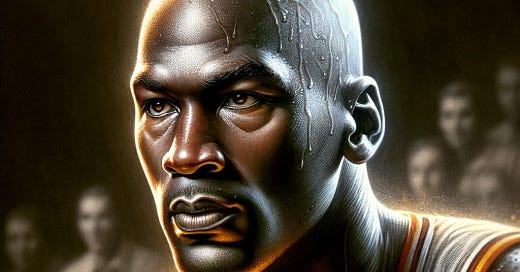Have you ever been falling asleep on the couch, only to move to your bed to try and fall asleep and fail?
If your answer is yes, then welcome to my world 😂…
When you are present, you can fall asleep like THAT. But, when you expect to fall asleep, you stay awake. Why?
Your expectations hold you back from experiencing the thing you want to experience.
Now, I know what you’re thinking: how does this relate to injured athletes? To tell you, let’s travel back in time…
February 2021: In my junior season, we played a tough team without our point guard. I was coming back from a surgery and went into this game without practicing for ~40 days.
Going into the game, we were going to “See if I could play a few minutes and shoot some 3’s.”
I ended up playing point guard for the entire game and shot 6/10 from 3. We won.
I played above what my expectations would have been – if I would’ve had them.
When an injured player outperforms their healthy self, this shows that expectations hurt them more than their injury. What's holding them back isn't their injury, it's actually what's in their head.
And I’m not talking about playing decent. I’m talking about the type of play that has ALL the dads going, “Wow, where did that come from?” “Maybe he should be injured more often.” “That surgery must’ve worked.”
Now, just like the couch example above, I’m not the only who’s had this experience.
Some more notable performances: Michael Jordan’s FLU game. Or when Tiger Woods won the 2008 U.S. Open with a severely injured knee and a double stress fracture in his left leg.
What led to these legendary performances?
The absence of expectations.
When you’re playing injured or coming back from an injury, you don’t have expectations for how you’ll perform.
The absence of expectations from yourself and others, allows you to play loose. You’re no longer emotionally attached to outcomes.
When athletes go into a game injured or come back from an injury, their expectations have been lifted. They don’t know what to expect because of their injury. Not knowing what to expect, by definition, is having no expectations. Without expectations you’re free to play loose. And when you play loose, you play well.
It’s like what my buddies and I used to joke about: If you play a bad team, you lose no matter what. Because if you win, you were supposed to. And if you don’t play well, you should’ve because they’re bad.
The same is true when playing while injured, but in a good way! If you play well, then you’re the G.O.A.T.
And if you don’t, then it’s no big deal because you tried and aren’t 100% back to healthy.
Teams:
This doesn’t just relate to players. I’ve seen it with teams, too. Like when an upset happens and people say “it’s all gravy from here.” Because the underdog pulled off an upset, they “shouldn’t” be where they are now, so they play loose. Worry-free.
We’ve all seen a team play awful and lose in a semi-final game. Then, they play and have fun in the 3rd place game. They shoot well. They win.
Should your expectations be that much different in a 3rd place game than in a semi-final?
During my friend’s junior season they were ranked #1 in 4A baseball with 4 D1 commits. They had HIGH hopes for that season, and lost in the title game. His senior season they were ranked #9 with 0 D1 commits. They had lower expectations for that season, and won the title game.
This brings up this question – Should you have expectations for yourself at all?
Note: It is normal, human tendency to have expectations.
The problem with high expectations: If you have super high expectations and one shot misses or one thing goes “wrong,” then it’s just a downhill spiral from there.
It’s like the kid who BALLS OUT in an open gym but he can’t hit the broad side of a barn while shooting in a game. He doesn’t have expectations in practice, but because he places expectations on himself to play well in games, because he plays well in practice, it acts as a mental barrier.
Everything below your high expectations is a failure.
This is why it’s difficult for a team trying to win back to back championships. Because they carry expectations – from the previous season's outcome.
The problem with low expectations: No one has ever won a game going in with low expectations.
You don’t want low expectations, you want NO expectations.
Expectations give you no advantage.
“The first rule of happiness is low expectations.” – Charlie Munger
“The first rule of injured players who dominate is they have NO expectations.” – Me
Imagine if you take the “no expectations” mindset and use it every time you play.
And that’d just be you, one player, without expectations — imagine what your team could do without them.
See you next week,
Dylan
P.S. I think this idea helps explain beginners' luck.
The first time you play: You go into something and have no expectations for it and play incredibly well.
The second time you play: You should play better (because you have experience and more knowledge) but you don’t because you place expectations on yourself from past performance.



